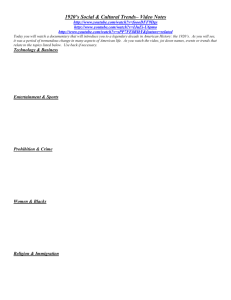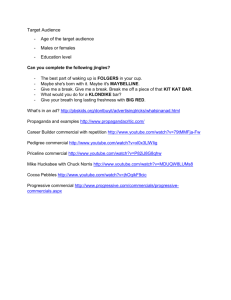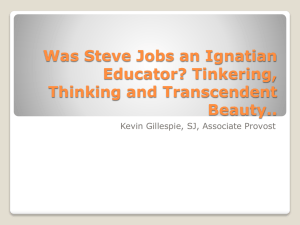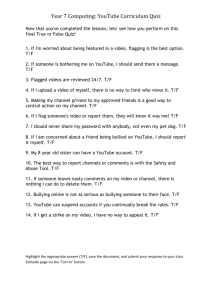CS101 Lecture 02: Brief History of Computing
advertisement
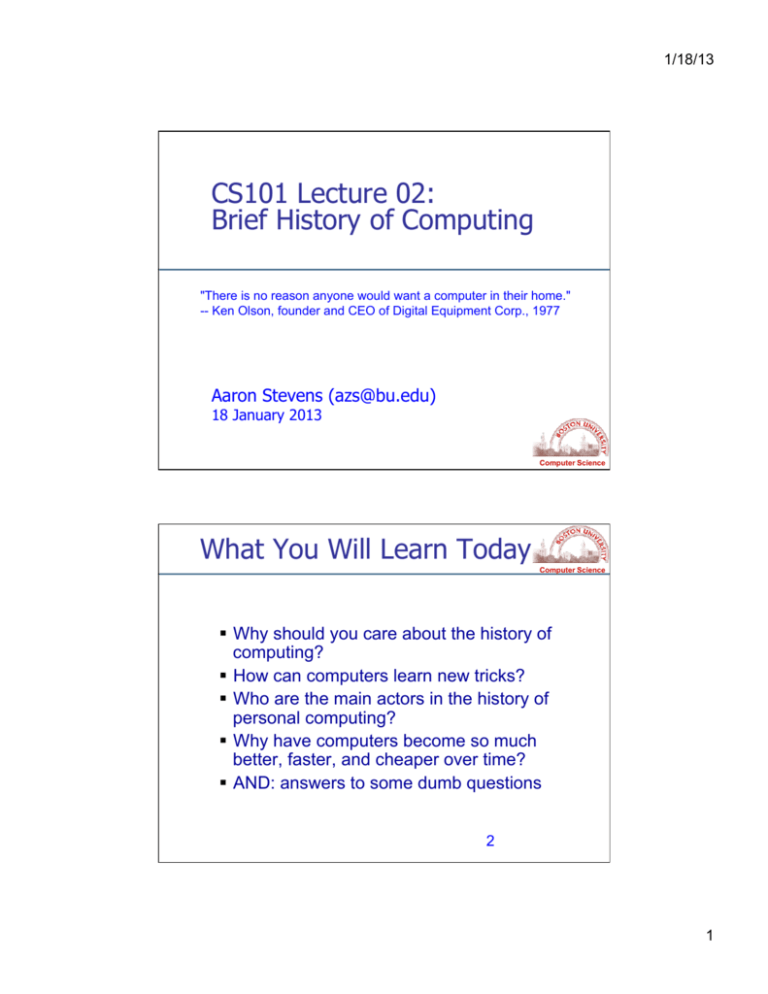
1/18/13 CS101 Lecture 02: Brief History of Computing "There is no reason anyone would want a computer in their home." -- Ken Olson, founder and CEO of Digital Equipment Corp., 1977 Aaron Stevens (azs@bu.edu) 18 January 2013 Computer Science What You Will Learn Today Computer Science Why should you care about the history of computing? How can computers learn new tricks? Who are the main actors in the history of personal computing? Why have computers become so much better, faster, and cheaper over time? AND: answers to some dumb questions 2 1 1/18/13 Why should we care? Computer Science Predictions are that by 2013 a supercomputer will be built that exceeds the computation capability of the human brain. Did You Know Globalization and The Information Age -Created by Karl Fisch, and modified by Scott McLeod http://www.youtube.com/watch?v=ljbI-363A2Q Is this for real? 3 Why should we care? Computer Science Predictions are that by 2049 a $1000 computer will exceed the computational capabilities of the human race. Did You Know Globalization and The Information Age -Created by Karl Fisch, and modified by Scott McLeod http://www.youtube.com/watch?v=ljbI-363A2Q Is this for real? 4 2 1/18/13 Computer Science Early History of Computing Computer Science The abacus was invented around 2400 BC. Ancient device to record numeric values. Above: a reconstructed Roman abacus 6 3 1/18/13 Early History of Computing Computer Science Blaise Pascal (1623-1662) Mechanical device to add, subtract, divide & multiply 7 Early History of Computing Computer Science Joseph Jacquard (1801) Jacquard s Loom, the punched card 8 http://www.youtube.com/watch?v=2ypE4ZJF7qY 4 1/18/13 Programmability Computer Science What tricks does your computer do? – Web browsing, email, instant messenger – Play games – Watch movies, organize photos – Word processing, spreadsheets, database Programmability is the ability to give a generalpurpose computer instructions so that it can perform new tasks. 9 3 Difference Engine Computer Science Charles Babages mechanical calculating machine, designed in 1820s. http://www.youtube.com/watch?v=KBuJqUfO4 10 5 1/18/13 Early Digital Computers Computer Science Harvard Mark I (1944) 11 Computer Science Harvard Mark I 12 6 1/18/13 Early Digital Computers Computer Science Harvard Mark I (1944) First fully automatic digital computer to be completed • 51 feet wide, 8 feet high, 2 feet deep • Built out of switches, relays, and rotating mechanical shafts/clutches • Storage for 72 numbers, each 23 decimal digits in length • Read instructions from paper tape, one at a time 13 First Computer Bug Computer Science Log of first computer bug, discovered by Grace Hopper, 1945 7 1/18/13 That 70’s Show… Computer Science Microsoft, 1978 Video: Triumph of the Nerds Computer Science PBS Series hosted by Bob Cringely http://video.google.com/videoplay?docid=-2539790754467363791 00:00 - intro // 03:00 09:24 - Cringely explains digital computing, program, 10:00 - data, instructions in binary, flipping switches, etc. Grace Hopper, programming COBOL, mainframe computers, punch cards, Wozniak, Jobs on programming, 12:58 - microprocessor (vacuum tubes, transistors, chips), Intel 15:30 - Altair 8800 19:20 - Homebrew computer club 20:30 - Mellon/Garland @ computer club, binary addition by flipping switches 22:30 - programming language/basic interpreter, Paul Allen, Bill Gates // 27:00 8 1/18/13 Video: Triumph of the Nerds Computer Science PBS Series hosted by Bob Cringely http://video.google.com/videoplay?docid=-2539790754467363791 27:00 - Microsoft in Albuquerque, basic for the Altair 29:12 - Steve Jobs, Jim Warren, sixties counter culture 31:30 - Apple Computer, Apple I, II // 35:00 35:00 - venture capital for apple, apple II, manufacture 37:10 - computer fair 39:55 - Intro VisiCalc on an Apple II 44:38 - wall street use of PC 46:15 - wrap up characters 48:50 - closing remarks Moore s Law Computer Science Computing hardware will keep getting better, faster, cheaper for the rest of our lives. 9 1/18/13 Cheaper, Faster, Better Computer Science Computing hardware will keep getting better, faster, cheaper for the rest of our lives. It’s about the software – Hardware performs only a limited set of fundamental instructions ( tricks ). – Software harnesses this set of instructions. – Computers do not think, and are not creative. 3 Computer Science 10 1/18/13 What You Learned Today Computer Science Be afraid of Scary Stories Mechanical Computers Programmability Digital Computers Moore’s Law 21 Announcements & To Do List Computer Science Readings this week: Reed ch 4, pp 64-79 (today) Reed ch 5, pp 83-87 (for next WED) http://www.computerhistory.org/timeline/ HW01 will be posted Friday by 2pm, due Tuesday @ midnight Future homeworks will be usually be posted on Wednesdays and due on Mondays. 11 1/18/13 Early Personal Computers Computer Science Computer Ads: http://blogs.pcworld. com/techlog/archives/002950.html Atari 400 (1980) http://www.youtube.com/watch?v=5sr28fygmOQ Commodore VIC-20 (1981) http://www.youtube.com/watch?v=gVX5cyMOGAk Compaq portable computer http://www.youtube.com/watch?v=YTMdXZ_QwTo 23 Additional Pictures Computer Science Covered in videos (mostly) 12 1/18/13 First Generation Hardware (1951-1959) Computer Science Vacuum Tube Stored a single element of memory (on or off) 25 First Generation Hardware (1951-1959) 8 Computer Science Magnetic Drum Memory device that rotated under a read/write head 26 8 13 1/18/13 First Generation Hardware (1951-1959) Computer Science Punch Card 27 First Generation Hardware (1951-1959) 8 Computer Science Magnetic Tape Drives Auxiliary storage devices. 28 8 14 1/18/13 Second Generation Hardware (1959-1965) Computer Science Transistor Replaced vacuum tube, fast, small, durable, cheap 29 Second Generation Hardware (1959-1965) 9 Computer Science Circuit Boards Transistors were soldered together 30 9 15 1/18/13 Second Generation Hardware (1959-1965) Computer Science Magnetic Disks 31 Third Generation Hardware (1965-1971) 9 Computer Science Integrated Circuits Replaced circuit boards; transistor on a silicon wafer chip – smaller, cheaper, faster, more reliable 32 10 16 1/18/13 Third Generation Hardware (1965-1971) Computer Science Terminal An input/output device with a keyboard and screen The Digital Equipment Corporation VT05, introduced 33 1970 10 Fourth Generation Hardware (1971-?) Computer Science Large-scale Integration Thousands of transistors on a single chip Die of an Intel 80486DX2 microprocessor (actual size: 12×6.75 mm) in its packaging. 34 Released in 1992, it has 1.2 million (1.2 X 106) transistors. 11 17 1/18/13 Fifth Generation Hardware (1990-?) Computer Science PCs, the Commercial Market, Workstations Personal Computers and Workstations emerge New companies emerge: Apple, Sun, Dell … Laptops, Cellphones, PalmPilot, iPod, etc. Everyone has his/her own portable computer - or several of them. Internetworking Virtually all computing devices connected to the Internet. High-speed and wireless connections are common. 35 11 18
